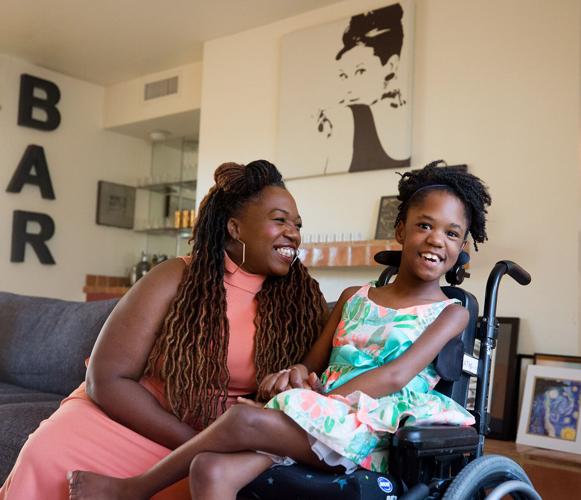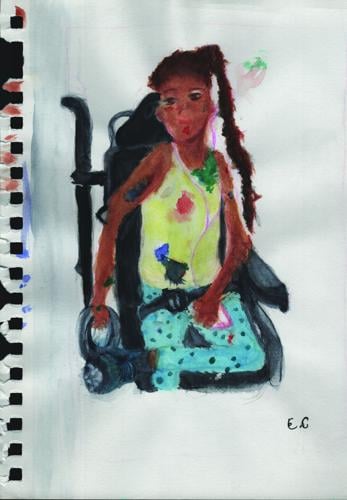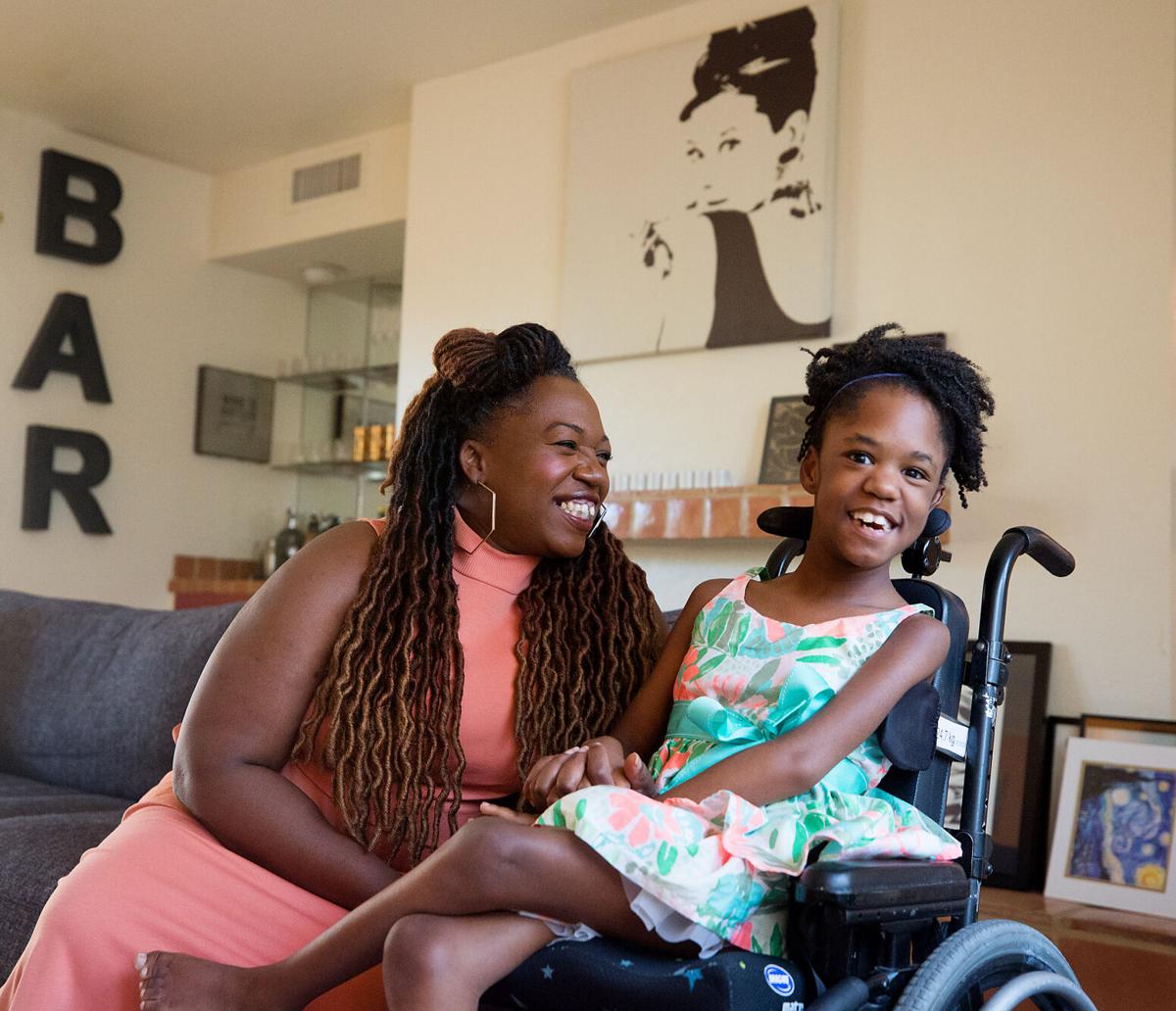This article was produced in a partnership between the Arizona Daily Star and the ProPublica Local Reporting Network, of which the Star is a member. ProPublica is a nonprofit newsroom that investigates abuses of power.
This story has been translated into different formats:
Emory Webster, 11, lives in Tucson. In a recent interview, she said she does not like to cuddle. Her favorite thing to do in the summer is swim.
Her mom, Adiba Nelson, listened carefully as Emory spoke — sometimes asking a question two or three times to make sure she understood — then explained that Emory loves to paint and hang out with friends. Recently, she’s embraced the idea of being a DJ, pretending to beatbox and scratch records.
“Ms. Emory is a little firecracker,” said Adiba, 43. “She is sassy as the day is long, but she’s also one of the sweetest kids ever and funny. Oh, God. She has such a sense of humor. It’s ridiculous.”
She’s also a typical preteen, Adiba added. “She gives me hell daily.”
Emory has cerebral palsy, which makes it difficult for her to talk to others, an extra challenge for a social preteen with lots of friends.

Emory Webster, a social preteen with a lot of friends.
She has an augmentative communication device provided to her through the Division of Developmental Disabilities, but Adiba said it is outdated — and broken. “I went to plug it in and it sparked and smoke came out of it. I was like, OK, I guess it’s done,” she said.
They’ve waited 18 months for another one. In mid-August, Adiba learned that Emory’s new device was approved in early July. As of the first week of October, they were still waiting to hear when they’d receive it.
In a statement, DDD officials said most of its clients receive help quickly and express satisfaction with their care. They did not respond to specific questions about Emory’s case.
Adiba said the DDD’s delay had impacted her ability to communicate with her own child.
“I always say, ‘Would you let your child sit with you and not speak for months?’” she said, adding, “I firmly believe they make it so hard for families that they give up.”
Photos: Arizonans with developmental disabilities were promised help. Instead, they face delays and denials
Emory Webster
Updated
Emory Webster, 11, with her mother, Adiba Nelson, in their home in Tucson, Ariz., on October 14, 2020. Webster was born with cerebral palsy. Nelson says Emory was evaluated for a communication device in July 2019 and she's still trying to get the device through Arizona's Developmental Disabilities Division.
Emory Webster
Updated
Emory Webster, 11, sits for a photo in her home in Tucson, Ariz., on October 14, 2020. Webster was born with cerebral palsy. Her mother, Adiba Nelson, is trying to get a communication device through Arizona's Developmental Disabilities Division.
Eric Nunn
Updated
Eric Nunn, 29, sits in his bedroom in Scottsdale, Ariz. on August 6., 2020. Nunn was born with Down's syndrome. He received services from Arizona's Developmental Disabilities Division until he was six years old and then didn't qualify anymore. Nunn is a huge fan of the movie "Grease," he says he loves the songs and actors including John Travolta and Olivia Newton-John.
Eric Nunn
Updated
Eric Nunn, 29, right, with his mom, Terri Myers at their home in Scottsdale, Ariz. on August 6., 2020. Nunn was born with Down's syndrome. He received services from Arizona's Developmental Disabilities Division until he was six years old and then didn't qualify anymore.
Jaden Ruiz
Updated
Jaden Ruiz, 9, in his bedroom in Avondale, Ariz. on October 12, 2020. Ruiz was born with autism and received services from Arizona's Developmental Disabilities Division until he was six years old and then didn't qualify anymore. Ruiz's parents challenged the department and will have his services reinstated.
Jaden Ruiz
Updated
Jaden Ruiz, 9, with his parents, Maria and Ivan in their home in Avondale, Ariz. on October 12, 2020. Ruiz was born with autism and received services from Arizona's Developmental Disabilities Division until he was six years old and then didn't qualify anymore. Ruiz's parents challenged the department and will have his services reinstated.
Michael Lundergan
Updated
Michael Lundergan, 32, was born with bronchopulmonary dysplasia. He requires 24-hour oxygen and sleeps with a ventilator at night. Michael requires 24-hour care, seven days a week. He receives his services through Arizona's Developmental Disabilities Division.
Michael Lundergan
Updated
Michael Lundergan, 32, was born with bronchopulmonary dysplasia. He requires 24-hour oxygen and sleeps with a ventilator at night. Michael requires 24-hour care, seven days a week. He receives his services through Arizona's Developmental Disabilities Division. Michael with his mother, Darlene Jones-Lundergan, on August 5, 2020.
Tyler Stumpf
Updated
Tyler Stumpf, 31, with his dog, Rigley, in his bedroom in Phoenix, Ariz. on October 12, 2020. Stumpf was born with Prader-Willi syndrome. Stumpf and his mother, Melody Linderwell, moved to Arizona from Iowa and Linderwell says she has struggled with communicating with Arizona's Developmental Disabilities Division to get services for her son.
Tyler Stumpf
Updated
Tyler Stumpf, 31, with his mom, Melody Linderwell, in their home in Phoenix, Ariz. on October 12, 2020. Stumpf was born with Prader-Willi syndrome. Stumpf and Linderwell moved to Arizona from Iowa and Melody says she has struggled with communicating with Arizona's Developmental Disabilities Division to get services for her son.




